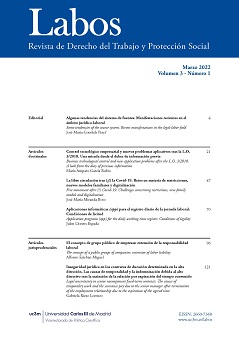Free movement after (?) Covid-19. Challenges concerning restrictions, new family models and digitalization
Abstract
The free movement of workers, in more than half a century of existence, has faced a number of obstacles. Few have been on the scale of the Covid-19 pandemic, which revealed unsuspected difficulties. This paper aims to analyse the solutions to these difficulties, both in terms of the restrictions arising from tools such as the Covid Passport and the possible guarantees for the future. Vaccination certificates, derived from a regulation that seeks to ensure free movement, have a dual nature as a restriction that deserves to be analysed. On the other hand, the consolidation of the idea of critical occupations is set to be of great importance but requires a final effort in its effective implementation. In addition to these issues, the work also studies the adaptation of existing legislation to the new family models, including considerations on the case law of the Court of Justice and same-sex marriages and their clash with certain legislations. Theoretical attention is also paid to the possible problems arising from marriages in non-recognised forms. Finally, some possibilities are raised with regard to platform work and digital teleworking.
Downloads
Copyright (c) 2022 LABOS Revista de Derecho del Trabajo y Protección Social

This work is licensed under a Creative Commons Attribution-NonCommercial-NoDerivatives 4.0 International License.
Loa autores ceden a la Revista Labos los derechos de reproducción y distribución, así como cualquier forma de explotación del trabajo.
Funding data
-
Agencia Estatal de Investigación
Grant numbers RTI2018-097917-B-100 “Retos del Derecho del Trabajo español ante la doctrina del Tribunal de Justicia en materia de política social y derechos fundamentales” -
European Regional Development Fund




